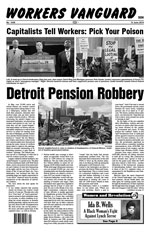
The Chinese Proletariat and the Tiananmen Uprising (Quote of the Week) To mark the 25th anniversary of the mass protests centered in Beijing’s Tiananmen Square, we reprint below excerpts from our article written immediately following the 3-4 June 1989 massacre of working people and students by the Stalinist regime of Deng Xiaoping. Far from backing down after the repression, millions of workers across China continued to wage mass strikes and protests, driven by anger over official corruption and the effects of Deng’s “market reforms.” While the imperialist media painted the upheaval as simply a pro-Western student movement for “democracy,” we emphasized that it marked an incipient proletarian political revolution against the bureaucracy whose rule undermined the workers state established with the overthrow of capitalism in the 1949 Chinese Revolution. Under the impact of the proletarian upsurge, the army, including the officer corps, had begun to fracture. The “Beijing Spring” reverberated in the Soviet Union and the East and Central European deformed workers states, which would soon face the sharply posed alternatives: workers political revolution or capitalist counterrevolution. The Chinese bureaucracy was able, over the next few weeks, to reassert control, mainly through bloody repression against the workers. The crucial missing element, during the Tiananmen events as well as today, is an authentic communist—i.e., Leninist-Trotskyist—party to lead the combative proletariat. JUNE 6—Chinese Stalinism has provoked a political revolution that may well spell the doom of this bureaucratic, anti-worker regime. The massacre of students and other protesters by the despised Deng regime has brought China to the brink of civil war. The bloodletting, with victims numbering perhaps in the thousands, did not succeed in intimidating the populace. Defiant and heroic, the rebels marched out of Beijing’s Tiananmen Square singing the socialist workers anthem, the Internationale.... Conditions are exceptionally favorable for the working class to take charge in China. Industrial workers have enormous social weight in the main arenas of struggle, Beijing and Shanghai, as well as Wuhan and Canton. It was the hundreds of thousands of working people pouring into the streets who stymied the regime’s attempt to impose martial law. Motorcycle squads of workers reported on troop placements around Beijing. And the mass of soldiers identify with the working people. They, too, are hard-hit by the raging inflation resulting from Deng’s market-oriented policies.... Only the working class, under the leadership of a genuine communist vanguard party, can unify China through developing a just, egalitarian and prosperous society. The restoration of centralized economic planning, under a workers and peasants government, is necessary to begin to even out the now enormous regional differences. At the same time, a Chinese soviet government would scrupulously respect the national rights of the non-Han minorities, granting autonomy for Inner Mongolia, Tibet and the Turkic-speaking peoples of Sinkiang.... A truly communist China would help forge the unity of the world working class and oppressed toilers against imperialism. A first and elementary step is to generously aid the reconstruction of impoverished Vietnam, whose decades-long struggle inflicted the greatest-ever defeat on U.S. imperialism. And Chinese workers must link up with the powerful Soviet working class, whose resistance to Gorbachev’s market-oriented perestroika can open the road to proletarian political revolution in the USSR. A revolutionary internationalist government in Beijing would also be a tremendous impetus for socialist revolution in Japan, the industrial powerhouse of Asia. To construct a Leninist-Trotskyist communist party in China it is necessary to break workers and radical students from liberal illusions and Stalinist-nationalist prejudices. —“Beijing Massacre—Civil War Looms,” WV No. 479, 9 June 1989
|
|
||||||||||||||||||||||||||||||||||||||||||||||||||


